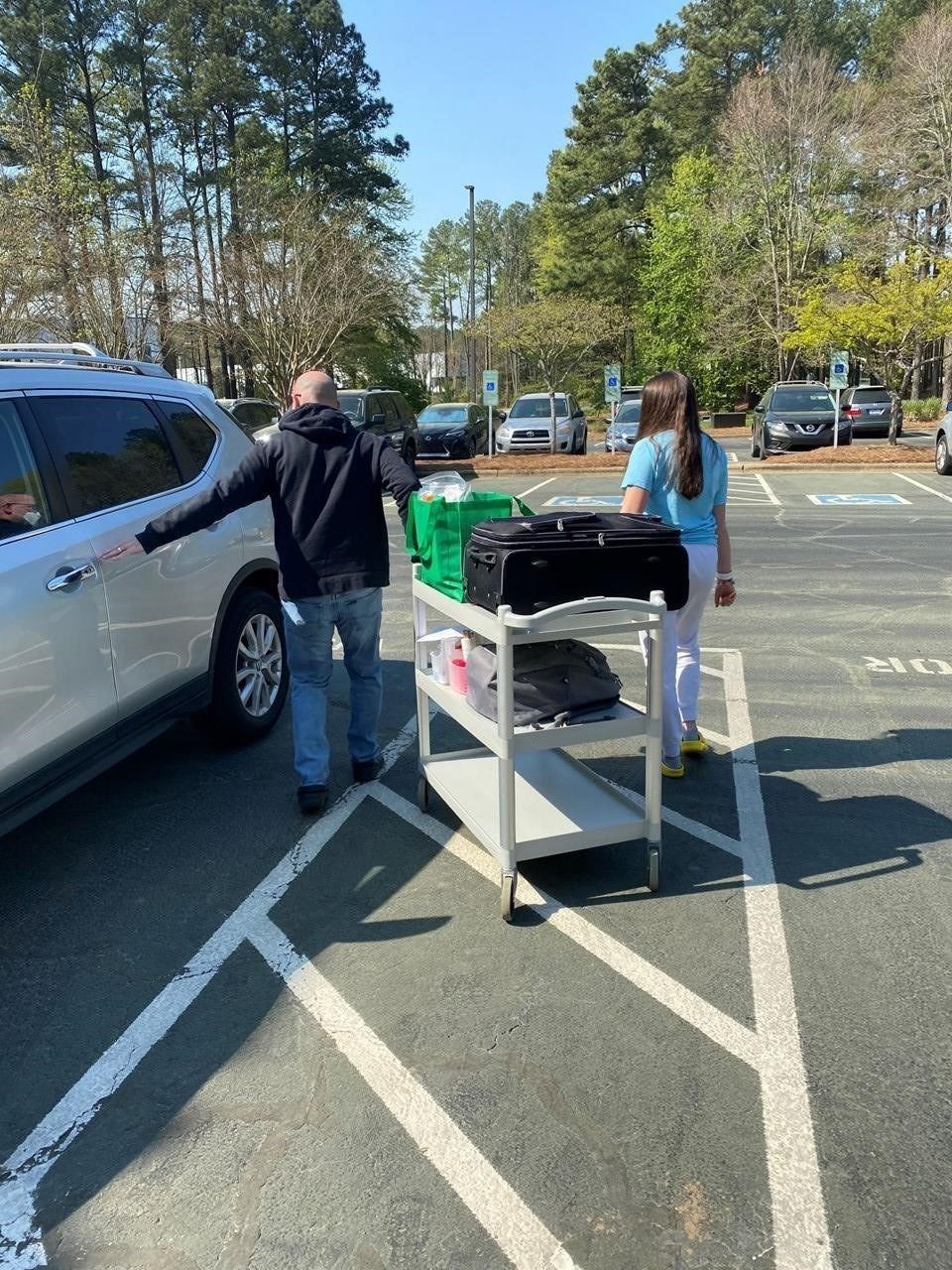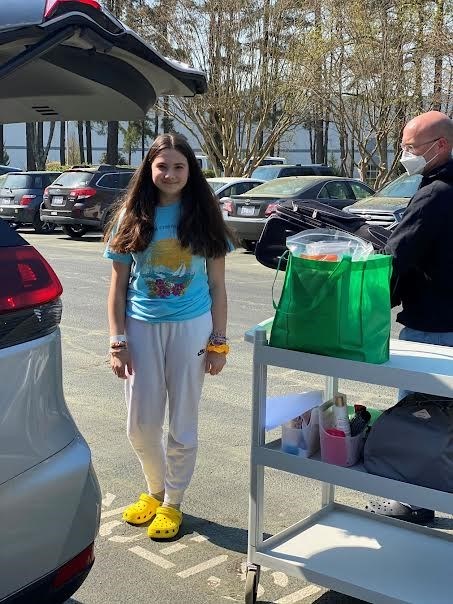 Going HomeCatherine FennemaThe average teenager does not typically have to experience getting diagnosed with an eating disorder, then going through treatment, and working towards recovery. Unfortunately, this is exactly what happened to me. In February 2021, I was diagnosed with an eating disorder (ED) called anorexia nervosa. After my body started to not function correctly due to malnutrition, I entered treatment to become medically stable and begin my journey toward recovery. As the first step in my recovery, I was placed in a residential program at a treatment facility that helps people recover from all types of eating disorders, which is where I met my hero.
Going HomeCatherine FennemaThe average teenager does not typically have to experience getting diagnosed with an eating disorder, then going through treatment, and working towards recovery. Unfortunately, this is exactly what happened to me. In February 2021, I was diagnosed with an eating disorder (ED) called anorexia nervosa. After my body started to not function correctly due to malnutrition, I entered treatment to become medically stable and begin my journey toward recovery. As the first step in my recovery, I was placed in a residential program at a treatment facility that helps people recover from all types of eating disorders, which is where I met my hero.
During my first night at the treatment facility, I was struggling. I was extremely homesick and missed my parents, but at the same time, I felt betrayed by them because they sent me away. At that stage of my journey, I did not want to recover. I did not understand what I had been doing to my body, nor did I understand why I needed to stop the eating disorder behaviors. That night, during the evening snack time, I could not stop crying. I became manic, and I could not eat. This is when I first met my hero, Mikey.
Mikey is a therapeutic assistant, or TA, at the facility where I was admitted. Due to the nature of therapeutic assistants’ jobs, patients are only allowed to know their TA’s last name. The TA’s job is to look after the patients and help them practice the strategies taught by the facility therapists. The TAs are with their patients at all times to make sure everyone is safe and following the guidelines set by the therapists and medical providers.
During my breakdown that first night, Mikey pulled me aside and into another room away from everyone. She sat with me and talked to me about why I was at the treatment facility and helped me identify why I was so upset. It was during that moment she became so significant to me. She offered me a lifeline when my struggle was unbearable.
Mikey’s lifesaving support continued throughout my seven-week stay, but she did not just support me. Throughout my time there, I noticed that she was constantly caring for all the patients, whether listening to their struggles or giving advice in her calm and gentle way. She was the patients’ favorite because she was like our second mother when we were so far from home, yet she never acted like we were a burden to her when we asked for help. Feeling like a burden to others is how many of the patients felt, including me but I never felt like one to her. She never let us feel unloved or unsupported. She made us each feel important, encouraging us to be the best version of ourselves. She never gave up on me when I felt like I could never recover. I treasure her because of how she helped me in my lowest moments, but I truly look up to her because of how she tirelessly cared for others.
In the residential program, the patients had limited connection to the outside world. There was a certain time called phone time when you could call home. The amount of time you get on the phone is dependent on your completion of meals. Due to it being my first day I only had 10 minutes to call my parents. I was still feeling sick and overwhelmed. My meal plan seemed like too much food so it was making me sick to the point where I was throwing up every meal. A meal plan is a set amount of food that should be consumed every day for those recovering from an eating disorder, and it is created by an experienced eating disorder dietitian to ensure patients get the proper nutrition needed for recovery. Eating in the early stages of recovery is both physically and emotionally painful. Crying and being emotionally drained made eating the meal plan even harder. Mikey understood that I was trying to eat, so she took me into another room to help calm me down. I could not calm myself down, and all the crying made me throw up repeatedly. Through all this, she stayed calm and never left my side. She told me that she was going to let me use her phone to call my parents even though this was something that could get her in trouble. She asked for my parent’s number and called them. It took them many calls for them to finally pick up. Hearing their voices made me calm down. In that call, I realized that I could not stay mad at them because they were only doing this for my safety. I began to understand that they wanted me to get better more than anything. That call Mikey made changed my view on recovery. It made me feel like I was not fighting alone. After talking to my parents for a little bit, I was able to go back and finish my meal. This is one thing that made me look up to her because she risked her job just so I could call home.
 Going HomeCatherine Fennema Not every experience with her was me feeling miserable. Mikey made being there fun by inspiring us to be our best selves. She was very encouraging and would have my patient group play games. She encouraged us to talk and make connections, and I still keep in touch with many of the people after being out for over six months. I have made several deep friendships that are still a part of my life. A part of her job is to do meal support which is helping patients through meals. “Meal support is the provision of emotional support during meal times, focused specifically on helping the patient to consume the food on their meal plan and redirecting behaviors that sabotage eating and recovery (Muhlheim).” We would play games and listen to music during mealtime. Mikey would cheer us up when the group’s mood was down. One thing that she would always say to me when things got hard was “you are strong.” Even though it is a simple phrase that people hear often, it made a significant impact on me. I never took though words to heart till she said them to me.
Going HomeCatherine Fennema Not every experience with her was me feeling miserable. Mikey made being there fun by inspiring us to be our best selves. She was very encouraging and would have my patient group play games. She encouraged us to talk and make connections, and I still keep in touch with many of the people after being out for over six months. I have made several deep friendships that are still a part of my life. A part of her job is to do meal support which is helping patients through meals. “Meal support is the provision of emotional support during meal times, focused specifically on helping the patient to consume the food on their meal plan and redirecting behaviors that sabotage eating and recovery (Muhlheim).” We would play games and listen to music during mealtime. Mikey would cheer us up when the group’s mood was down. One thing that she would always say to me when things got hard was “you are strong.” Even though it is a simple phrase that people hear often, it made a significant impact on me. I never took though words to heart till she said them to me.
Mikey is a hero to me because she is loving and risked her job for me. She also helped me through one of the hardest times of my life. She pushed me to be my best and helped me to recover from my eating disorder by supporting me through one of my darkest times. I can’t thank her enough for all that she had done for me. Mikey has influenced me to be like her when I grow up, to help people when they are at their lowest. She has made me believe in myself and work towards my goals of recovery.
Page created on 3/29/2022 4:58:11 PM
Last edited 4/15/2022 2:51:34 PM
Lauren Muhlheim, PsyD. “Meal Support in the Treatment of Eating Disorders.” Verywell Mind, Verywell Mind, 28 Jan. 2020, https://www.verywellmind.com/meal-support-in-the-treatment-of-eating-disorders-1138365
